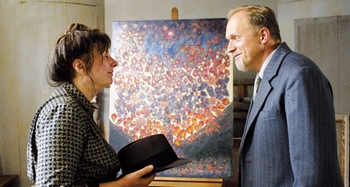Mark:
With a wonderful performance by Yolande Moreau at its centre, Séraphine is an almost brilliant portrayal of the life of a minor French painter from the early 20th Century – Séraphine Louis – and the winner of seven César awards in 2009 including Best Film and Best Actress.
Moreau is the title character Séraphine, who is introduced to the audience in 1913 in rural France as housekeeper, scavenger and thief. She rather feverishly performs her tasks in multiple places of employment, seemingly just scraping together enough to eat, and yet there appears to be a reason for her vigorous approach to her chores. At night, she utilises the scraps and debris of her day to form rudimentary paint that allows her to follow her calling and express the beauty she sees as God’s creation on canvas.
At night, she utilises the scraps and debris of her day to form rudimentary paint that allows her to follow her calling and express the beauty she sees as God’s creation on canvas.
The film is a gentle and ambling portrayal of the character and her developing relationship with her patron, German art critic Wilhelm Uhde, and often seems to take its pace from that of the countryside of the setting. Séraphine is shown walking through fields and sitting in trees, immersed in her experience of God so truly that the pressing requirements of her life melt into the background. It is only as the film slowly progresses that her madness will become evident.
Moreau handles this transition with skill, never resorting to clichéd demonstrations of pathology but building a character that is clearly psychologically impaired. She engenders sympathy without ever seeming to be asking for it, in a performance of grace and power. Little wonder her’s was judged the best of all French actresses’ performances in 2008.
Ulrich Tukur is similarly excellent in the main supporting role as Louis’ patron, although there are elements of his character that are left unexplained that may provoke concern around his motivations. This may not be the responsibility of Tukur, but rather writer/director Martin Provost.
The film is shot beautifully, with the French landscape vividly brought to life and the small town lifestyle under the shadow of two World Wars and the Great Depression evocatively demonstrated. Costume design and art direction allow the sense of reality to pervade this biopic and do justice to Provost’s vision.
That it often feels to be moving rather slowly should not dissuade its audience from enjoying the quietly developing drama, and the eventual outcome for the major characters feels authentic and never gaudy. A well-handled biopic that should provoke interest in a figure from the art world that for many may otherwise have remained hidden. Recommended.
Rating: